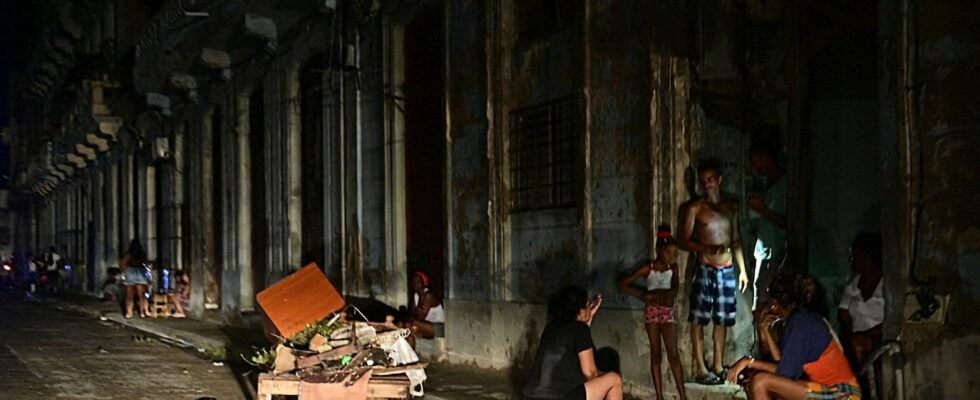Cuba was still facing, this Saturday, October 19, the paralysis of its electrical system the day after a giant outage which deprived its 10 million inhabitants of power. “There will be no respite” until the service is “fully restored,” President Miguel Diaz-Canel declared Friday evening during a crisis meeting, broadcast by state television.
“The system is without electricity throughout the country”, after the shutdown of the Antonio Guiteras thermal power station, in the center-west of the country, Lazaro Guerra, general director of electricity at the Ministry of Energy and Mines. He said that when the power plant shut down, “the system collapsed,” causing a giant blackout.
At nightfall, the broad avenues of Havana were plunged into darkness, with the exception of points of light provided by certain hotels, hospitals and a few private restaurants or bars that could operate generators, AFP noted. On Thursday, the Cuban president announced that Cuba was in a situation of “energy emergency” faced with difficulties in purchasing the fuel necessary to power its power stations, due to the strengthening of the embargo that Washington is imposing on the island. communist since 1962. “It is yet another demonstration of all the problems that the blockade is causing us,” he insisted Friday evening.
“Aberrant”
At the beginning of the evening, the national electricity company (UNE) indicated that it had generated, thanks to annexed “microsystems”, a minimum level of current, which should be used to restart thermoelectric power stations and floating generators in several provinces of the country, and which benefits already to some 19,000 people across the island. “It’s aberrant,” Eloy Font, an 80-year-old retiree living in central Havana, told AFP. “This demonstrates the fragility of our electricity system […] there are no reserves, there is nothing to keep this country on its feet, we live from day to day,” he complained.
For three months, Cubans have suffered from power cuts that have become more and more frequent. On Thursday, the national energy deficit, which hovered around 30%, reached 50%, reinforcing the exasperation of the population. Classes were suspended at all levels in the country until Monday, and all entertainment venues were closed.
Obsolete
The first restrictions date back to March, with the government’s increasing difficulties in obtaining fuel and parts needed to operate and repair the country’s aging thermoelectric power plants. In recent weeks in several provinces, outages have lasted more than 20 hours a day.
On Thursday, Prime Minister Manuel Marrero announced the suspension of all non-essential public services in order to prioritize the supply of electricity to hospitals, businesses and homes. On the island, electricity is produced from eight dilapidated thermal power plants, sometimes broken down or under maintenance, as well as several floating power plants, which the government rents to Turkish companies, and generators. Most of this infrastructure requires fuel to operate.
The island is currently experiencing its worst crisis in three decades, with shortages of food and medicine and chronic power cuts. Power cuts were one of the triggers for the unprecedented anti-government protests of July 11, 2021. In September 2022, the island had already experienced a widespread blackout after the passage of Hurricane Ian which struck the island. west of the island.
